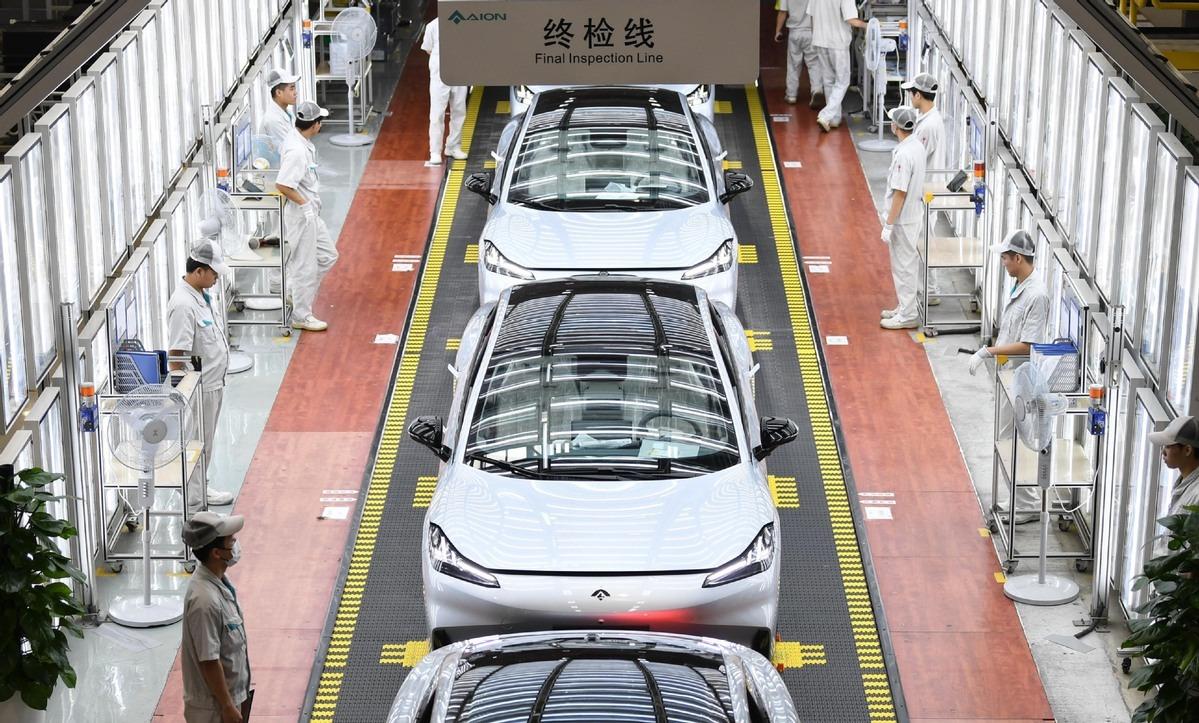Sector ushers in 'new development stage' with a total production of 20m units
 This photo shows the final inspection line of the new energy vehicle assembly shop of GAC Aion in Guangzhou, Guangdong province, July 3, 2023. (PHOTO / XINHUA)
This photo shows the final inspection line of the new energy vehicle assembly shop of GAC Aion in Guangzhou, Guangdong province, July 3, 2023. (PHOTO / XINHUA)
China's new energy vehicle output has surpassed 20 million units, which market insiders said is a milestone in the country's auto development progress.
"Such a record reflects that China's NEV sector has entered a new development stage that is large-scale, globalized and high-quality. The sector is becoming a major part of the nation's modern industrial system based on the real economy," said Fu Bingfeng, executive vice-president and secretary-general of the China Association of Automobile Manufacturers (CAAM), during a Monday event marking the achievement in Guangzhou, Guangdong province.
The association said the country's NEV output surpassed 5 million units in September 2020, and hit 10 million units in February 2022, and then proceeded to double the figure in less than a year and a half.
Zhang Xiang, visiting professor of the Engineering Department of Huanghe Science and Technology University, said: "The 20-million milestone is significant. China's NEV development has marched from an initial stage to a rapidly-growing stage. Now, annual sales of NEV companies such as BYD have outstripped those of traditional petrol vehicle enterprises such as FAW-Volkswagen and SAIC Volkswagen. Meanwhile, China ranks first in terms of automobile export, and the development of NEVs has contributed a lot."
BYD said its monthly NEV sales hit 253,000 units in June, surging 88.2 percent on a yearly basis. In the first half, its NEV sales surpassed 1.25 million units, up 94.25 percent year-on-year, ranking tops globally.
BYD said that it has rolled out various products to meet increasingly diversified consumer demand, offering green solutions for different scenarios.
Overseas, BYD sold 74,300 NEVs in the first half, surpassing its whole-year figure of 55,900 in 2022.Its NEVs have hit roads in 53 countries and regions, including Japan, Germany, Australia, Singapore, Thailand, Brazil and New Zealand.
Industry experts said the rapid development of China's NEV sector is due to constant breakthroughs in core technology, steady improvement in industrial chains as well as accelerated construction of the charging infrastructure.
By the end of last year, China had built 5.21 million charging piles and 1,973 battery swap stations, forming the world's largest charging and swapping network, said the Ministry of Industry and Information Technology.
Zhang said that with such development momentum, more Chinese NEVs will be able to replace traditional fossil-fueled vehicles with NEV technology maturing.










